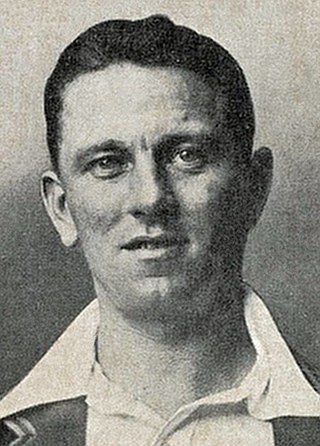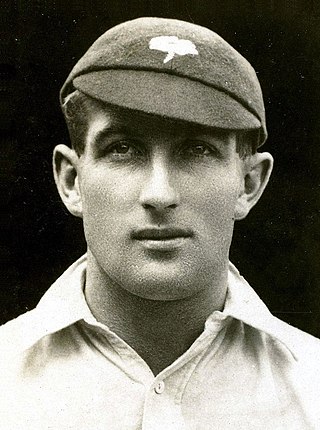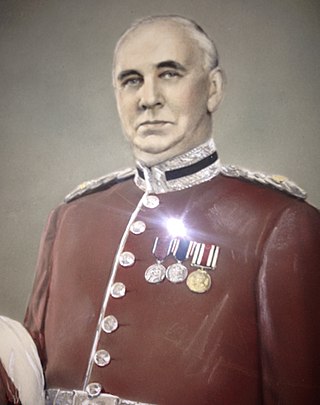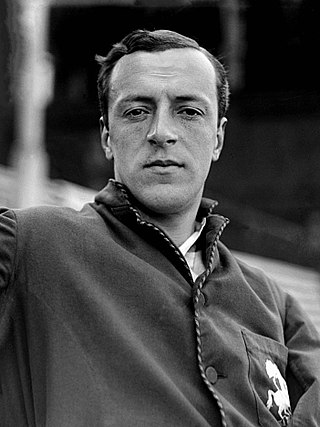
Sir Leonard Hutton was an English cricketer. He played as an opening batsman for Yorkshire County Cricket Club from 1934 to 1955 and for England in 79 Test matches between 1937 and 1955. Wisden Cricketers' Almanack described him as "one of the greatest batsmen in the history of cricket". He set a record in 1938 for the highest individual innings in a Test match in only his sixth Test appearance, scoring 364 runs against Australia, a milestone that stood for nearly 20 years. Following the Second World War, he was the mainstay of England's batting. In 1952, he became the first professional cricketer of the 20th century to captain England in Tests; under his captaincy England won the Ashes the following year for the first time in 19 years.

Arthur Edward Robert Gilligan was an English first-class cricketer who captained the England cricket team nine times in 1924 and 1925, winning four Test matches, losing four and drawing one. In first-class cricket, he played as an amateur, mainly for Cambridge University and Sussex, and captained the latter team between 1922 and 1929. A fast bowler and hard-hitting lower order batsman, Gilligan completed the double in 1923 and was one of Wisden's Cricketers of the Year for 1924. When his playing career ended, he held several important positions in cricket, including that of England selector and president of the Marylebone Cricket Club (MCC). A popular figure within cricket, he was widely regarded as sporting and friendly.

Arthur Percy Frank Chapman was an English cricketer who captained the England cricket team between 1926 and 1931. A left-handed batsman, he played 26 Test matches for England, captaining the side in 17 of those games. Chapman was appointed captain for the final, decisive Test of the 1926 series against Australia; under his captaincy, England defeated Australia to win the Ashes for the first time since 1912. An amateur cricketer, Chapman played Minor Counties cricket for Berkshire and first-class cricket for Cambridge University and Kent. Never a reliable batsman, Chapman nevertheless had a respectable batting record. He could score runs very quickly and was popular with spectators. As a fielder, contemporaries rated him extremely highly. Although opinions were divided on his tactical ability as a captain, most critics accepted he was an inspirational leader.

Arthur Webb Mold was an English professional cricketer who played first-class cricket for Lancashire as a fast bowler between 1889 and 1901. A Wisden Cricketer of the Year in 1892, he was selected for England in three Test matches in 1893. Mold was one of the most effective bowlers in England during the 1890s but his career was overshadowed by controversy over his bowling action. Although he took 1,673 wickets in first-class matches, many commentators viewed his achievements as tainted.

Frederick Martin, also known as Fred Martin and Nutty Martin, was an English professional cricketer who bowled left-arm medium-pace spin. Martin played first-class cricket between 1885 and 1892, primarily for Kent County Cricket Club, and appeared twice in Test matches for the England cricket team. He was considered one of the best left-arm spin bowlers in the country between 1889 and 1891.
Arthur Haygarth was a noted amateur cricketer who became one of cricket's most significant historians. He played first-class cricket for the Marylebone Cricket Club and Sussex between 1844 and 1861, as well as numerous other invitational and representative teams including an England XI and a pre-county Middlesex. A right-handed bat, Haygarth played 136 games now regarded as first-class, scoring 3,042 runs and taking 19 wickets with his part-time bowling. He was educated at Harrow, which had established a rich tradition as a proving ground for cricketers. He served on many MCC committees and was elected a life member in 1864.

Maurice Leyland was an English international cricketer who played 41 Test matches between 1928 and 1938. In first-class cricket, he represented Yorkshire County Cricket Club between 1920 and 1946, scoring over 1,000 runs in 17 consecutive seasons. A left-handed middle-order batsman and occasional left-arm spinner, Leyland was a Wisden Cricketer of the Year in 1929.

Abraham "Abe" Waddington, sometimes known as Abram Waddington, was a professional cricketer for Yorkshire, who played in two Test matches for England, both against Australia in 1920–21. Between 1919 and 1927 Waddington made 255 appearances for Yorkshire, and in all first-class cricket played 266 matches. In these games, he took a total of 852 wickets with his left arm fast-medium bowling. Capable of making the ball swing, Waddington was admired for the aesthetic quality of his bowling action. He was a hostile bowler who sometimes sledged opposing batsmen and questioned umpires' decisions, behaviour which was unusual during his playing days.

Lincolnshire County Cricket Club is one of twenty minor county clubs within the domestic cricket structure of England and Wales. It represents the historic county of Lincolnshire.

Sir Francis Eden Lacey was an English cricketer, cricket administrator and barrister. Lacey played first-class cricket for Hampshire from 1880 to 1896, either side of the club losing its first-class status between 1886 and 1894; it was during this period that he captained Hampshire in 1888 and 1889. A prolific batsman for Hampshire, he scored over 2,000 runs for the county in 33 first-class appearances, which included a double century against Kent in 1884. As a roundarm slow bowler, he also took 45 wickets for Hampshire, including three five wicket hauls. He made additional appearances in first-class cricket for Cambridge University and the Marylebone Cricket Club (MCC), amongst others. In a minor fixture against Norfolk he made 323 runs, which remains the highest individual score in second-class county cricket.

Arthur Frederick Jeffreys was an English first-class cricketer and Conservative politician. He served as the Member of Parliament for Basingstoke from 1887 until his death in 1906. As a cricketer, he made 26 appearances in first-class cricket, mostly for the Marylebone Cricket Club, though he also played for Hampshire and in Australia for New South Wales.

Sir Robert Pattinson, JP, DL was a British Liberal politician and businessman. Pattinson joined his family's railway contracting firm after finishing school and was quickly appointed to senior positions. In 1900, he became chairman of Ruskington Urban District Council and four years later joined Kesteven County Council, eventually becoming an alderman and serving as its chairman for 20 years between 1934 and his death in 1954. He chaired the Sleaford Liberal Association (1900–18) and was nominated as the party's representative for Sleaford shortly before World War I broke out. He contested Grantham unsuccessfully in 1918, but was returned for the seat in 1922, serving until he was defeated in the following year's general election. Several other unsuccessful attempts at a parliamentary career followed. He chaired several bodies responsible for maintaining Lincolnshire's waterways, served as a magistrate for Kesteven and Lindsey and sat as Lincolnshire's High Sheriff in 1941. Knighted in 1934, Pattinson died aged 82 in 1954 after several years of illness.
Arthur Howard Heath TD was a British industrialist, first-class cricketer, Rugby union international and Conservative Party politician.
Clement Booth was an English first-class cricketer and administrator. Booth played first-class cricket for several teams, but was largely associated with Cambridge University, Hampshire and the Marylebone Cricket Club. He was Hampshire County Cricket Club's second captain at first-class level. As an administrator, he was the honorary secretary of both Lincolnshire and Hampshire.
Sir Frederick Thomas Arthur Hervey-Bathurst, 4th Baronet was an English first-class cricketer and Conservative politician. Hervey-Bathurst served in the British Army with the Grenadier Guards prior to his political career, serving with distinction in the Crimean War. He was elected a Conservative Party Member of Parliament for South Wiltshire in 1861, holding that political office until the 1865 general election. As a cricketer, he played first-class cricket for Hampshire and the Marylebone Cricket Club.
Edward Cornwall Lee was an English first-class cricketer. As a first-class cricketer, Lee was most active during the late 1890s and at the turn of the 20th-century, playing varsity cricket for Oxford University and county cricket for Hampshire. His first-class career cricket on an infrequent basis to 1909, with Lee making a total of 85 appearances.
Arnold Rylott was an English cricketer who played for Marylebone Cricket Club (MCC) from 1872 to 1888 and for pre-first-class Leicestershire between 1875 and 1890.

Bernard James Tindal Bosanquet was an English cricketer best known for inventing the googly, a delivery designed to deceive the batsman. When bowled, it appears to be a leg break, but after pitching the ball turns in the opposite direction to that which is expected, behaving as an off break instead. Bosanquet, who played first-class cricket for Middlesex between 1898 and 1919, appeared in seven Test matches for England as an all-rounder. He was chosen as a Wisden Cricketer of the Year in 1905.












